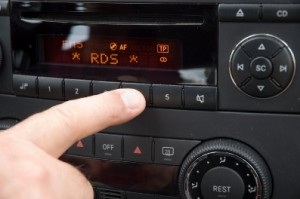Recently there was lots of press reporting of a study conducted by the Transport Research Laboratory which looked at how listening to sport radio might influence driving behaviours. They found that reaction times were up to 20 per cent slower and last minute hard braking nearly doubled when people were listening to sport radio. Much of the media attention also emphasised the comparative similarity of the increased risk of listening to sport radio and drink driving.
We have a relatively good understanding of how mobile phone use is distracting and how this distraction impacts on our driving behaviour. Far less is known about how listening to the radio or music might affect driving. Essentially both distractions are caused by the same thing. We only have limited information processing resources. If something else, such as a mobile phone conversation or listening to sport radio, uses up some of our attention we have fewer resources available to dedicate to driving. So how much does listening to music or radio really influence our driving behaviour?
First, it’s interesting to consider why so many people listen to music or the radio whilst driving. For many people it’s a way to relieve boredom or to counteract fatigue and tiredness. One survey[1] found that 52% of respondents turn on music or the radio if they’re feeling sleepy, even though this is one of the less effective countermeasures. Drivers seem to believe that listening to music or the radio will improve driving performance, or at least avoid deterioration in performance by relieving fatigue. Unfortunately not all research supports this idea.
Much of the research looking at the consequences of listening to music or the radio has not actually aimed to examine these effects. Instead, they have been interested in the effects of mobile phone use and the music or radio condition has simply been used as a comparator task. Typically, these studies have found that having a conversation on a mobile phone[2] or even with a passenger in the car[3] causes reaction times to slow down, but that listening to music does not. It therefore seems that listening to music or the radio is at least less dangerous, or distracting, than using a mobile phone.
In car entertainment is currently diversifying and the use of televisions and DVD players for passengers in the rear of a car is becoming more and more common. Although the driver cannot see the visual display, they often can hear the audio and this may provide distraction. One study[4] compared driving behaviour whilst participants were in a driving simulator with no sound, with a radio playing or with the audio from a film in the background. As with the previous research, neither the radio nor the film audio was found to impair driving performance.
Whilst there is little evidence for audio distractions having a detrimental effect on driving behaviours, there is quite consistent evidence showing that the type of music that you listen to influences your driving behaviour. In one study[5] participants took part in a computer-based driving game whilst either listening to music that they chose or music that was chosen by the experimenter. They found that participants who were listening to their own music drove more efficiently, were less distracted and anxious and also enjoyed driving more than those listening to the music selected by the experimenter.
The emotional content of music can also influence driving behaviour. One research project[6] asked participants to listen to happy, sad or neutral music whilst driving in a simulator. They found that, in comparison to the neutral music, speed decreased when listening to either happy or sad music. However, when listening to the sad music, participants maintained good lateral control, but when listening to the happy music participants were more likely to stray out of their lane.
Relatively little research has really examined how listening to the radio or music influences your driving behaviour. Some research suggests that there are no negative consequences, whereas others suggest that what you are listening to might have either positive or negative effects. It seems likely that more research is needed to get a true understanding of the possible effects of auditory stimulation whilst driving. For example, the current evidence suggests that what you are listening to is likely to either enhance or impair your driving performance. Listening to music that you like and choose seems to be beneficial, whereas listening to a sports radio programme can have a detrimental effect, particularly if you are listening to your favourite team play.
To some extent, all possible distractions whilst driving come down to the same basic problem. Driving requires a great deal of attention and information processing, and as mentioned earlier, we only have limited resources available. Consequently, any distraction to the driver could potentially have a negative impact on their driving. Some distractions, such as the use of a mobile phone, take away more of our attention and information processing capabilities and significantly reduce the resources that can be devoted to driving.
One problem that is likely to become increasingly apparent is the number of distractions that drivers can be exposed to. If a driver is dealing with and paying attention to mobile phones, sat navs, talk radio shows and DVD players, passengers and who knows what else all at the same time, it’s obvious that their driving will be influenced. Perhaps future research needs to examine not only how individual distracters influence driving behaviour, but also the effects of multiple distracters.
[1] Anund et al. (2008)
[2] Bellinger et al (2009)
[3] Consiglio et al (2003)
[4] Hatfield and Chamberlin (2008)
[5] Cassidy and MacDonald (2009)
[6] Percher et al (2009)
Dr Victoria Bourne (BA Hons, DPhil)
Consultant to Driving Risk Management Ltd





